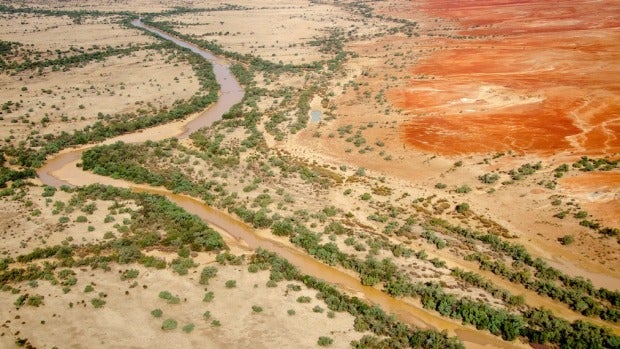Australian Aboriginal Group Denounces Human Rights Threat of Fracking
An Australian Aboriginal group denounces plans to frack in Channel Country, Australia.

This page was published 11 years ago. Find the latest on Earthjustice’s work.
In a remote part of Australia, in the state of Queensland, lies a vast area called Channel Country. Winding rivers with large water holes and multiple channels braid across wide floodplains in a remarkable arid landscape. But every now and then huge floods cause the rivers to overflow, transforming the landscape into verdant wetlands that provide vital habitat for waterbirds, fish, reptiles and mammals.
Channel Country is the traditional territory of the Mithaka people, who have lived there for longer than anyone can remember. The Mithaka’s connection to their lands and waters remains strong, and the rivers and waterholes—the lifeblood of this arid region—are especially important to them. Indeed, the Mithaka’s culture is inseparable from their special relationship with their rivers and waterholes.
“The stories of our rivers and waterholes tell us who we are and how we are supposed to be," explains Mithaka representative Scott Gorringe. "If our rivers and waterholes are polluted by petroleum exploitation and fracking, we will lose our stories. If we lose our stories, we lose who we are, and we lose our will to go on.”
Today, the Mithaka’s traditional lands and waters are threatened by the proposed fracking of hundreds of wells to extract shale oil and gas that underlies the Mithaka’s rivers and floodplains. This fracking will require the injection of pressurized toxic chemicals into wells over one mile deep through and underneath giant underground water reservoirs to fracture the rock that surrounds the oil and gas. The process of fracking threatens to harm Channel Country’s lands, waters and human health.
Unfortunately, the government of the state of Queensland is pushing ahead with plans to allow fracking in Channel Country despite the strong and consistent opposition of the Mithaka. Recently it removed legislation that protected Channel Country and its rivers from these threats, and it introduced policies to support gas and oil exploitation. But the Queensland government failed to meaningfully involve the Mithaka in these decisions that threaten their culture and territory.
Under international law, the Mithaka have a right to enjoy and maintain their culture. Fracking poses a serious pollution threat to Channel Country’s waters and, consequently, to the Mithaka’s culture and identity.
The Mithaka also have a right under international law to be meaningfully consulted and involved in decisions about the exploitation of resources on their traditional lands, especially when that exploitation threatens their culture. Unfortunately, the Queensland government has consistently failed to meaningfully consult with the Mithaka when making decisions and taking actions to support fracking in Channel Country.
Because the Queensland government has not listened to the Mithaka’s concerns, the Mithaka have been forced to take the issue to the international level. So on December 3, 2014, the Mithaka alerted the UN Special Rapporteur on the Rights of Indigenous Peoples to the violation of their human rights and asked the Special Rapporteur to investigate and call on Australia to protect their rights.
Earthjustice assisted the Mithaka to prepare the letter to the UN Special Rapporteur. You can view the Mithaka’s letter here.
The International Program partners with organizations and communities around the world to establish, strengthen, and enforce national and international legal protections for the environment and public health.